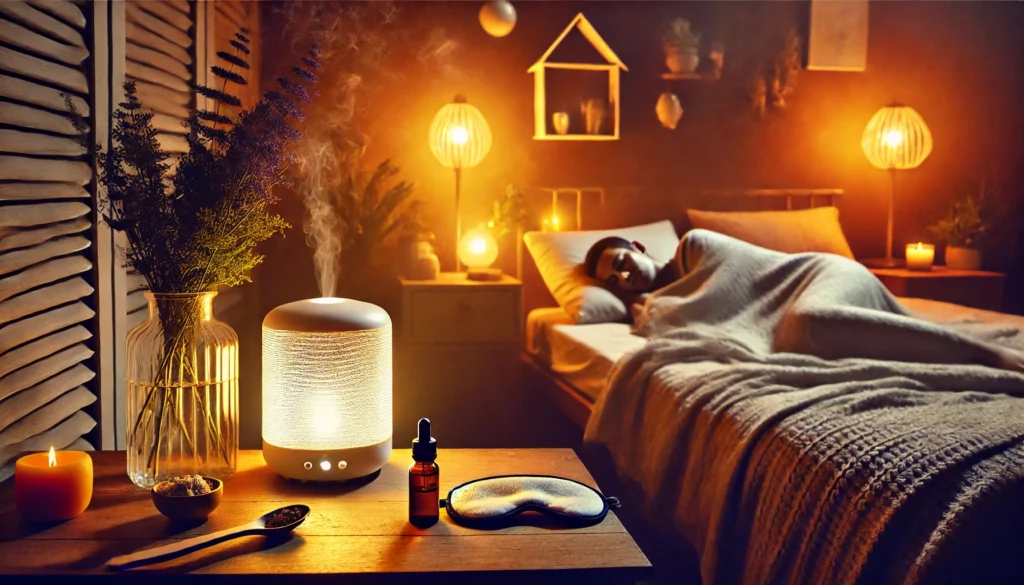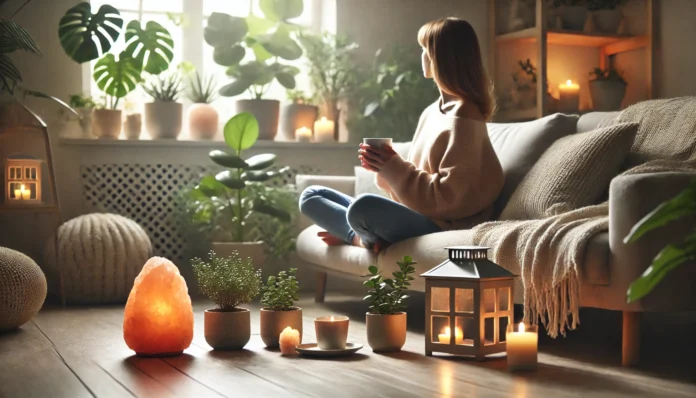Aromatherapy and essential oils have also been explored as adjunctive strategies for anxiety relief. While often viewed with skepticism by the medical community, a growing number of clinical studies have demonstrated the anxiolytic potential of specific essential oils such as lavender, bergamot, and chamomile. Inhalation or topical application of these oils can stimulate the olfactory system, which in turn activates brain regions associated with mood and emotional regulation. For example, lavender oil has been shown in randomized controlled trials to reduce anxiety levels in patients undergoing dental procedures and in individuals with generalized anxiety. Although aromatherapy is not a substitute for conventional treatment, it offers a gentle and accessible complement for those exploring what can I take to calm my nerves through natural and sensory-based interventions.
You may also like: Proven Relaxation Techniques for Stress and Anxiety: Evidence-Based Strategies to Calm Your Mind and Body
Digital mental health tools are another emerging frontier in anxiety management. Mobile apps and virtual platforms now offer guided meditations, cognitive behavioral exercises, journaling prompts, and real-time mood tracking, providing users with continuous support at their fingertips. Programs like Headspace, Calm, and MoodMission are increasingly being used to deliver evidence-based content in a user-friendly format. Some apps have been tested in clinical settings and have shown measurable reductions in anxiety and depressive symptoms, particularly when combined with other forms of treatment. These tools democratize access to mental health resources and may serve as valuable anxiety aids for individuals who face barriers to traditional therapy, such as cost, time constraints, or geographic limitations.
Finally, the role of social connection in alleviating anxiety cannot be overstated. Human beings are wired for connection, and supportive relationships act as a buffer against stress and emotional turmoil. Engaging in meaningful conversations, participating in group activities, and fostering a sense of belonging can reduce feelings of isolation and foster emotional stability. Studies show that people with strong social support networks are less likely to experience chronic anxiety and are more resilient in the face of life’s challenges. For those seeking holistic strategies beyond pharmacological options, investing in relationships and building community ties can be a profoundly effective answer to the question of what can I take to calm my nerves.
Together, these additional approaches enrich the landscape of anxiety aids and reflect the growing emphasis on integrative, personalized care. Whether used in tandem with therapy or as part of a proactive wellness plan, these strategies underscore the principle that calming the nerves involves more than just medication—it requires nurturing the mind, body, and spirit in a unified, sustainable way.t Can I Take to Calm My Nerves? Evidence-Based Anxiety Aids That Support Long-Term Mental Wellness
Anxiety is more than just occasional stress or worry. For millions of individuals worldwide, anxiety manifests as a persistent, often overwhelming sense of fear or unease that can significantly disrupt daily life. Whether it stems from a specific phobia, generalized anxiety disorder (GAD), panic disorder, or the pressures of modern life, the need for effective, sustainable solutions is more pressing than ever. This growing concern has prompted many to ask the same critical question: what can I take to calm my nerves? With an overwhelming array of pharmaceutical drugs, natural remedies, supplements, and lifestyle strategies available, discerning which options are safe, evidence-based, and effective can be a complex undertaking. This article offers an in-depth exploration of scientifically supported anxiety aids, delving into both conventional and alternative approaches that promote long-term mental wellness.
Understanding the Science Behind Anxiety and the Nervous System
To effectively address anxiety, it is essential to first understand how it arises within the body. Anxiety is a complex emotional and physiological response that primarily involves the central nervous system, particularly the brain’s limbic system and the autonomic nervous system. When the brain perceives a threat—whether real or imagined—it activates the hypothalamic-pituitary-adrenal (HPA) axis, triggering the release of stress hormones like cortisol and adrenaline. This is part of the classic “fight-or-flight” response, which prepares the body to react to danger.
For individuals with anxiety disorders, however, this system is often overactive or dysregulated, leading to chronic activation and a range of symptoms, including increased heart rate, restlessness, muscle tension, and difficulty concentrating. Understanding this biological foundation allows researchers and clinicians to identify specific targets for treatment, including neurotransmitters like serotonin, gamma-aminobutyric acid (GABA), and norepinephrine. Consequently, interventions that aim to balance these neurochemical pathways—whether through medication, herbal supplements, or behavioral changes—can offer meaningful relief.
Prescription Medications: Traditional Routes with Proven Efficacy
Pharmaceutical treatments remain a cornerstone of anxiety management, particularly for individuals with moderate to severe symptoms. Selective serotonin reuptake inhibitors (SSRIs), such as sertraline, fluoxetine, and escitalopram, are commonly prescribed and have been shown to reduce symptoms by increasing serotonin availability in the brain. These medications often require several weeks to take full effect, but they are considered safe and effective for long-term use under medical supervision.
Another frequently prescribed class of drugs is benzodiazepines, which include medications like diazepam (Valium), lorazepam (Ativan), and alprazolam (Xanax). These drugs work by enhancing the effect of GABA, a calming neurotransmitter that inhibits neural activity. While benzodiazepines can provide rapid relief from acute anxiety symptoms, they are generally recommended for short-term use due to the risks of dependence and withdrawal. Other medications, such as beta-blockers and buspirone, also serve as anxiety aids by targeting different neurochemical pathways, offering additional options for patients who do not respond well to SSRIs or benzodiazepines.
It is crucial to approach prescription medications with an understanding of both their benefits and limitations. While they can significantly alleviate symptoms, they may also come with side effects such as drowsiness, sexual dysfunction, and gastrointestinal issues. Furthermore, they should never be stopped abruptly without medical guidance. For many individuals, the question of what can I take to calm my nerves may initially point toward these traditional options, but a growing number are exploring complementary or alternative interventions that carry fewer side effects and offer more holistic support.

Natural Supplements: Bridging Traditional Wisdom with Modern Evidence
In recent years, natural supplements have gained traction as viable anxiety aids, particularly among those seeking gentler, non-pharmaceutical alternatives. While not all supplements are created equal, several have been studied for their anxiolytic effects and show promising results. One of the most well-researched is L-theanine, an amino acid found in green tea that promotes relaxation without sedation. Studies suggest that L-theanine may increase alpha brainwave activity, which is associated with a calm, alert mental state.
Another popular supplement is magnesium, a mineral involved in more than 300 enzymatic reactions in the body, including those that regulate the nervous system. Low magnesium levels have been linked to increased anxiety, and supplementation may help restore balance. Similarly, omega-3 fatty acids, particularly EPA and DHA found in fish oil, have shown potential in modulating mood and reducing anxiety symptoms by influencing inflammatory pathways and neurotransmitter function.
Herbal remedies such as ashwagandha, passionflower, valerian root, and kava have also demonstrated anxiolytic properties in clinical studies. Ashwagandha, an adaptogenic herb used in Ayurvedic medicine, appears to lower cortisol levels and support resilience to stress. However, not all herbal supplements are without risks. For instance, kava has been associated with liver toxicity in some cases, emphasizing the importance of medical supervision when incorporating herbal remedies into one’s regimen. For those wondering what can I take to calm my nerves naturally, these supplements offer compelling, research-backed options that align with both ancient traditions and contemporary science.
Mindfulness-Based Interventions: Training the Brain for Long-Term Calm
While medications and supplements can play a pivotal role in managing anxiety, psychological strategies are equally vital for fostering long-term resilience. Among these, mindfulness-based interventions (MBIs) have emerged as powerful, evidence-supported tools for reducing anxiety. Mindfulness involves paying attention to the present moment with a non-judgmental attitude, which can help break the cycle of ruminative thinking that often fuels anxiety.
Practices such as mindfulness-based stress reduction (MBSR) and mindfulness-based cognitive therapy (MBCT) have been extensively researched and found to reduce symptoms of generalized anxiety disorder, panic disorder, and social anxiety. Functional MRI studies reveal that mindfulness training can lead to structural and functional changes in the brain, particularly in regions associated with emotional regulation, such as the prefrontal cortex and amygdala.
These practices do not merely provide short-term relief but cultivate a skillset that enhances emotional awareness, reduces reactivity, and promotes cognitive flexibility. Incorporating mindfulness into daily life—through practices like meditation, mindful breathing, and body scans—can create a sense of inner stability that medication alone may not offer. For individuals seeking sustainable anxiety aids that do not involve pharmacological intervention, mindfulness represents a compelling and accessible option supported by a robust body of scientific literature.
Cognitive Behavioral Therapy: Rewiring the Anxious Mind
Cognitive behavioral therapy (CBT) remains one of the most effective psychological treatments for anxiety disorders. Rooted in the understanding that thoughts, feelings, and behaviors are interconnected, CBT helps individuals identify and reframe distorted thinking patterns that contribute to anxiety. For example, someone who experiences panic attacks might learn to challenge catastrophic interpretations of bodily sensations, ultimately reducing their fear response.
CBT often incorporates exposure techniques, where patients are gradually exposed to anxiety-provoking stimuli in a controlled setting. This helps desensitize the nervous system and fosters new, non-threatening associations. Numerous meta-analyses have confirmed CBT’s efficacy across a range of anxiety disorders, including generalized anxiety disorder, social anxiety, and obsessive-compulsive disorder. Unlike medication, CBT equips individuals with lifelong skills that empower them to manage anxiety independently.
A particularly valuable aspect of CBT is its adaptability. It can be delivered through one-on-one sessions, group therapy, or digital platforms, making it accessible to a wide audience. For those asking what can I take to calm my nerves, CBT offers a non-pharmaceutical answer—one that involves taking psychological tools rather than pills. By altering the thought patterns that drive anxious feelings, CBT facilitates lasting transformation and emotional freedom.
Lifestyle Modifications: Everyday Choices That Influence Mental Health
Beyond structured therapies and supplements, everyday lifestyle choices exert a profound influence on mental health. Regular physical activity, for instance, has been shown to significantly reduce anxiety symptoms by promoting the release of endorphins and improving overall brain function. Aerobic exercises like walking, running, and swimming can modulate stress responses, enhance mood, and improve sleep—all critical factors in anxiety management.
Nutrition also plays a crucial role in supporting mental well-being. Diets rich in whole foods, lean proteins, complex carbohydrates, and healthy fats provide the building blocks for neurotransmitter synthesis and brain health. Emerging research suggests that the gut-brain axis—a bidirectional communication system between the gastrointestinal tract and the brain—may be particularly important. A healthy gut microbiome has been linked to lower anxiety levels, prompting interest in probiotics and fermented foods as potential anxiety aids.

Frequently Asked Questions: Anxiety Aids and Calming Strategies
1. Can personalized nutrition plans act as anxiety aids, and how do they compare to traditional supplements?
Yes, personalized nutrition plans are emerging as a novel category of anxiety aids, particularly in functional and integrative medicine circles. Unlike generalized dietary advice, these plans tailor food intake based on genetic markers, microbiome profiles, and metabolic needs, offering a precision-based approach to mental wellness. While traditional supplements like magnesium or L-theanine target specific biochemical pathways, personalized nutrition seeks to optimize the entire physiological environment that influences anxiety. For instance, addressing individual food sensitivities or inflammatory triggers can enhance emotional regulation by calming gut-brain signaling. So if you’re wondering what can I take to calm my nerves beyond capsules and teas, a medically supervised, data-driven nutrition strategy may offer profound and sustainable relief.
2. Are wearable devices useful as anxiety aids for real-time nervous system feedback?
Wearable biofeedback devices have become increasingly popular as anxiety aids, particularly for those who value a data-driven approach to mental health. These gadgets track physiological markers such as heart rate variability (HRV), skin conductivity, and breathing patterns to alert users when their nervous system is under stress. Unlike passive interventions, wearables foster self-awareness and allow users to apply calming techniques in real time. For individuals asking what can I take to calm my nerves without relying solely on pills or therapy, wearables paired with breathing exercises or meditation apps offer a tech-integrated solution. While they don’t treat the root cause of anxiety, they enhance early detection and self-regulation, empowering users with actionable feedback.
3. What role does creative expression play in calming the nervous system, and can it complement other anxiety aids?
Creative outlets such as journaling, painting, music, or dance can act as powerful anxiety aids by engaging the brain’s reward circuitry and reducing activity in areas linked to fear and worry. These activities provide an emotional outlet and can lower cortisol levels, making them effective tools for nervous system regulation. While creative expression is not a replacement for clinical interventions, it enhances the efficacy of therapies like CBT and mindfulness by adding a somatic and expressive layer to healing. If you’re searching for more holistic answers to what can I take to calm my nerves, tapping into artistic practices could unlock therapeutic benefits that standard treatments might overlook. Therapists often incorporate art or music therapy to complement conventional treatments, particularly for individuals resistant to verbal processing.
4. Are there any emerging plant-based compounds being studied as future anxiety aids?
Yes, several promising plant-based compounds are currently under clinical investigation as next-generation anxiety aids. Cannabidiol (CBD), derived from hemp, has gained attention for its potential anxiolytic effects without the psychoactive properties of THC. Another compound, apigenin, found in chamomile and parsley, interacts with GABA receptors and may offer calming effects with fewer side effects than benzodiazepines. Rhodiola rosea and bacopa monnieri are adaptogens being studied for their neuroprotective and stress-reducing properties. For those who’ve asked what can I take to calm my nerves using nature’s pharmacy, these compounds hint at an exciting future where herbal therapies are better standardized and clinically validated. However, rigorous research is essential before these options can be safely recommended for mainstream use.
5. How do long-term anxiety aids differ from quick-acting calming solutions?
Long-term anxiety aids often work by addressing root causes such as neurotransmitter imbalances, chronic stress, or cognitive distortions, whereas quick-acting solutions generally provide symptomatic relief. For example, SSRIs and CBT are designed for long-term use and gradual improvement, while practices like deep breathing or taking a fast-acting supplement like kava offer temporary calm. The key difference lies in sustainability and risk profile. If your question is what can I take to calm my nerves immediately, short-term tools may be effective, but they should be part of a broader, integrative strategy. Long-term solutions build resilience and can reduce the frequency and intensity of anxiety episodes over time, making them essential for enduring mental wellness.
6. What social or environmental factors can serve as indirect anxiety aids?
Environmental factors such as access to green spaces, natural light exposure, and ambient noise levels can profoundly influence anxiety levels. Similarly, social factors like strong community ties, family support, and workplace flexibility serve as protective buffers against chronic stress. These external elements act as indirect but powerful anxiety aids by modifying the context in which anxious responses are triggered or reinforced. If you’re wondering what can I take to calm my nerves without ingesting anything, cultivating a soothing environment and enriching your social connections are invaluable strategies. Research in environmental psychology even supports the concept of “therapeutic landscapes,” where specific physical environments promote emotional restoration.
7. Can adjusting digital habits function as an anxiety aid in the modern age?
Absolutely. Digital hygiene—such as setting screen time limits, reducing social media exposure, and curating news consumption—can significantly reduce cognitive overload and anxious reactivity. Constant digital stimulation keeps the nervous system in a state of alertness, which may worsen underlying anxiety. In this way, intentional digital boundaries function as modern anxiety aids by lowering baseline stress and promoting restorative downtime. If you’re evaluating what can I take to calm my nerves in an era dominated by screens, sometimes the best prescription is strategic disconnection. Digital detox periods and mindfulness-based screen use are gaining popularity as preventative mental health strategies.
8. Are there any overlooked micronutrients that can function as anxiety aids?
Yes, beyond the commonly discussed magnesium and omega-3s, lesser-known micronutrients like zinc, selenium, and B-complex vitamins play crucial roles in anxiety regulation. Zinc deficiency has been linked to impaired GABA function, while selenium supports thyroid health, which is closely tied to mood stability. Vitamin B6, in particular, is essential for the synthesis of neurotransmitters like serotonin and dopamine. For those asking what can I take to calm my nerves through nutrition, assessing micronutrient status with a healthcare provider could uncover hidden imbalances that are fueling anxiety. Optimizing these nutrients often enhances the effectiveness of both pharmaceutical and behavioral interventions.
9. How does identity and personal narrative influence the success of anxiety aids?
Personal beliefs, cultural values, and life narratives all shape how individuals respond to anxiety interventions. For example, someone who views anxiety as a moral failing may resist therapy, while another who sees it as a neurological condition might embrace medication. This psychosocial context can either amplify or diminish the effectiveness of anxiety aids, depending on alignment with personal identity. If you’re exploring what can I take to calm my nerves, choosing solutions that resonate with your worldview and lived experiences can foster deeper engagement and long-term success. Mental health professionals increasingly recognize the value of narrative therapy and cultural competence in designing personalized care plans.
10. What role does intergenerational trauma play in chronic anxiety, and how do anxiety aids address it?
Intergenerational trauma refers to the transmission of emotional wounds across generations, often manifesting as heightened vigilance or chronic anxiety in descendants. While traditional anxiety aids like CBT or medication can mitigate symptoms, trauma-informed care is essential to fully address the underlying patterns. Techniques such as EMDR (Eye Movement Desensitization and Reprocessing) or somatic experiencing are specifically designed to work with trauma held in the body. If your question is what can I take to calm my nerves when the anxiety seems rooted in family history, specialized therapy that addresses inherited emotional patterns may be the missing piece. Understanding this dynamic can shift the focus from symptom suppression to holistic healing.

Sleep hygiene is another cornerstone of anxiety prevention and recovery. Poor sleep can exacerbate anxiety, while quality sleep supports emotional regulation and cognitive clarity. Maintaining a consistent sleep schedule, creating a restful environment, and limiting caffeine and screen time before bed can dramatically improve sleep quality. Together, these lifestyle factors offer a holistic framework for calming the nervous system and fostering long-term resilience.
natural remedies for anxiety, holistic mental health, calming supplements for stress, alternative treatments for anxiety, emotional wellness strategies, nervous system regulation, natural stress relief techniques, herbal solutions for anxiety, brain health and mood, mindfulness for emotional health, integrative approaches to anxiety, stress management techniques, lifestyle changes for anxiety relief, mental resilience training, therapy alternatives for anxiety, evidence-based relaxation methods, calming activities for adults, functional medicine for mental health, psychological self-care tools, coping skills for chronic stress
Further Reading:
13 Over-the-Counter (OTC) Natural Remedies for Anxiety
Nutritional strategies to ease anxiety
Treatment and support for anxiety
Disclaimer
The information contained in this article is provided for general informational purposes only and is not intended to serve as medical, legal, or professional advice. While Health11News strives to present accurate, up-to-date, and reliable content, no warranty or guarantee, expressed or implied, is made regarding the completeness, accuracy, or adequacy of the information provided. Readers are strongly advised to seek the guidance of a qualified healthcare provider or other relevant professionals before acting on any information contained in this article. Health11News, its authors, editors, and contributors expressly disclaim any liability for any damages, losses, or consequences arising directly or indirectly from the use, interpretation, or reliance on any information presented herein. The views and opinions expressed in this article are those of the author(s) and do not necessarily reflect the official policies or positions of Health11News.


